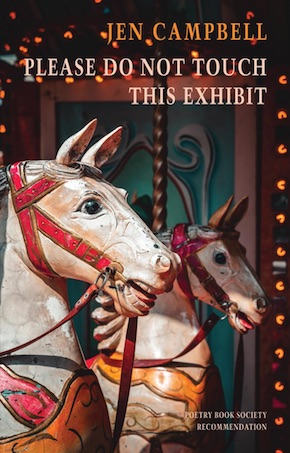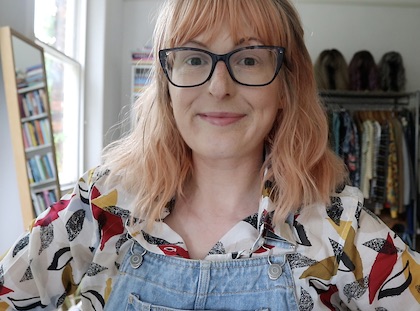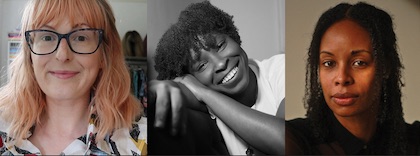from Please Do Not Touch This Exhibit
by Jen Campbell
When I started writing the poems in Please Do Not Touch This Exhibit, it had been four years since my first IVF appointment. I wrote the collection over the following two years, not knowing what the end would be; I’d aimed to finish the book by winter 2022, realising I might be pregnant by then, I might not be. Wherever my body found itself, the book would meet me there. It was a strange but also vital time to be writing.
When you start to think about parenthood, you inevitably think of your own childhood. I spent much of mine in hospital, born with a rare and complicated condition that required dozens of surgeries, the first of which was when I was just three months old. Doctors crafted hands for me, knitted skin grafts, gave me tear ducts, monitored the linings of my organs. I’ve long known that people have opinions about disabled bodies. I’d also heard (and have now witnessed first-hand) that people have lots of opinions about would-be-pregnant bodies too, and when those two things collide it’s… interesting. I’m used to being the medical specimen, the person that doctors line up to peer at. I’m indebted to many brilliant doctors, and I’ve also encountered those who actively dislike disabled patients (can’t cure them; unnecessarily complicated, etc. etc.). From the wonderful embryologist who told me, after a very difficult month, that if I were her daughter she would be proud of me; to the consultant who (when we were discussing why my embryos kept dying) snapped: “don’t use the word ‘dying’, Jennifer; it attributes unnecessary emotion to the situation.”
I’ve long known that people have opinions about disabled bodies. I’ve also now witnessed first-hand that people have lots of opinions about would-be-pregnant bodies too, and when those two things collide it’s… interesting.”
In the days of the Victorian freakshow, people with my condition were labelled Lobster Children. In the past few years, it’s felt as though I’ve been observing my body from the outside, too, either by disassociation or simply the surreal nature of IVF treatment, especially on a body that twists and turns. Please Do Not Touch This Exhibit is an exploration of disability, IVF and folklore – the stories we tell ourselves about our bodies, and the stories that get told about us; the many narratives that have a tendency to slip out of our control…
—
When I Revisit This Room, I Want to Leave Again
While she waits for the computer to restart, she gently
bites the end of her biro.
The screen flickers, then it dies. She sighs:
‘You could just get pregnant, then have an abortion.’
I nearly snap in my seat; marvelling at what
an awful magician this one is – just brazenly
pulling blood from a hat. She taps
at the keys, not looking at me:
‘So, Jennifer, have you thought about that?’
Have I thought about it?
Perhaps she would like a tour of my brain
where I store the faces of every child I’ll never have?
‘That is cheaper for us than IVF, you see.’
[My geneticist is on holiday, so instead of talking to him, I am talking to a woman whose name I have since banished. A doctor who has somehow managed to distance herself from her disabled patients to such a degree that I am not sure that I exist, let alone my hypothetical children.]
She goes on to explain how easy it would be,
just a scan, just to peek – and if it looked like me:
‘A quick procedure, all gone.’
She stifles a yawn, ignoring
the copies of me that now litter her floor.
[There is a student doctor sitting in on our session. He is a fluster of embarrassed feathers. I’m so sorry,’ he mouths, clearly, behind her back.
What a fragment of humanity.]
I struggle to explain why her suggestion is not
the same as us gathering eggs and putting them beneath
a microscope. I say I couldn’t cope, personally,
actually – emphatically not… but she has already
glazed over, disappointed by my lack
of sacrifice. For who am I
to deny a magician
their great act of disappearance?
[She tuts, angrily sifting through my file. After a while, says I’ll be pleased to hear that, even though IVF is more expensive than me having a hypothetical abortion (should my hypothetical child, in fact fifty percent of my hypothetical children, deign to be born the same as me), it is still much cheaper than me having a child with my syndrome, because of all the operations that child would then need.
Therefore, she concludes, I can have my IVF, if it will stop me from reproducing myself.]
‘That way, we still save money, you see.’
In disbelief, I sense that this is the part
where I am supposed to applaud.
Somehow, I am able to pick up
my phantom limbs, and I clap for her.
I clap, and clap, and clap,
until my wrists are raw.
Until I’m pretty sure I still exist.
***
The Trees Are Part of the Process
It seems so predictable
that I grew these
eggs in springtime.
That we let them
rest over the summer
as farmers peered
beneath their skins.
Then, naturally:
in the orange months,
when only one
of them remained,
we let them place it
(gently)
inside my womb
Of course, we waited – for two
weeks made of Sundays but
I don’t know what
to tell you, except:
the autumn leaves
are dying, and we
cannot stop them
spiralling, cannot stop
them entering, cannot
prevent their fall.
from Please Do Not Touch This Exhibit (Bloodaxe Books, £10.99)
—

Jen Campbell grew up by the sea in the northeast of England and currently lives in London. She is an award-winning poet and bestselling author of twelve books for adults and children. Her most recent titles include The Beginning of the World in the Middle of the Night, The Sister Who Ate Her Brothers, and Marceline: Defender of the Sea. Her books have been translated into over twenty languages. She has won both the Jane Martin Poetry Prize and an Eric Gregory Award. Her poetry pamphlet The Hungry Ghost Festival was published by The Rialto in 2012. Her first book-length collection, The Girl Aquarium, was published by Bloodaxe Books in 2019. It was shortlisted for the poetry category of the Books Are My Bag Readers Awards 2019 and was a semifinalist for the Goodreads Choice Awards 2019 (Best Poetry category). She won the Spelt Poetry Competition 2022 for her poem ‘The Hospital Is Not My House’ from her second collection Please Do Not Touch This Exhibit, which is published by Bloodaxe Books in paperback and eBook).
Read more
jen-campbell.co.uk
@jenvcampbell
@BloodaxeBooks
—
Launch reading by Jen Campbell, Courtney Conrad and Nicole Sealey
Free event on YouTube

Jen Campbell, Courtney Conrad and Nicole Sealey launch their new poetry collections. All three read live and discuss their new collections with each other and with the host, John Challis. Courtney Conrad’s pamphlet I Am Evidence is published as the winner of the 2022 Mslexia Women’s Poetry Pamphlet Competition, judged by Imtiaz Dharker.
Streamed live on Tuesday 19 September 2023. Now available to watch on the Bloodaxe Books YouTube channel.
youtube.com

